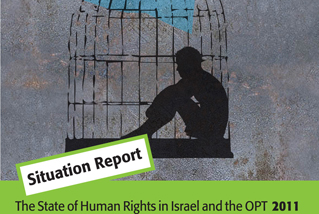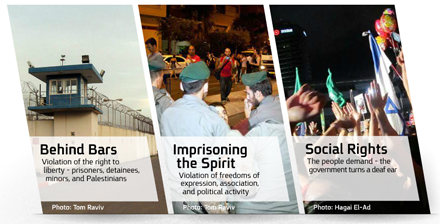
To mark International Human Rights Day, the Association for Civil Rights in Israel (ACRI) is publishing its annual report on the state of human rights in Israel and the Occupied Territories – focusing on basic freedoms and the social protest.
“Prison walls must not separate the prisoner from his humanity […] a prison must not turn into a paddock, and a prison cell must not turn into a cage.”
HCJ 540/84 Yosef vs. Head of Central Prison of Judea and Samaria, 40 (1), 567,573.
ACRI’s State of Human Rights Report 2011: Anti-democratic legislation and measures taken against demonstrators endanger freedom of expression and protest | There are still severe violations of human rights behind the walls of Israeli prisons, despite improvements in certain prison conditions | The rights of foreign citizens and of their children are severely and systematically trampled, without monitoring and oversight and far from the public eye | Erosion of the right to a dignified living and of other social rights
To open a flash presentation summarizing the report, click on the image below:

ACRI’s “State of Human Rights – Situation Report 2011,” published just before International Human Rights Day, details the grave violations of rights in Israel’s prisons and describes a rising trend of restrictions on liberty in its broad sense: freedom of expression, freedom of association, freedom of political activity and even freedom of thought and opinion. The report also deals with the social protest that has swept Israel in the past summer: the erosion of social rights; attempts to infringe on the freedom of expression of the protesters; and the current results of the protest.
Every year, ACRI publishes The State of Human Rights report just before International Human Rights Day (December 10) in order to present the Israeli public and authorities with an extensive and current examination of the state of human rights in Israel and the Occupied Territories and to sound a warning call regarding particularly egregious violations; to point out key processes and to note areas of improvement; and to draw attention to certain human rights infringements that have not garnered media attention and public awareness.
ACRI’s Executive Director, Hagai El-Ad: “With this report, ACRI displays the reality of human rights issues: when some of us are less equal than others – none of us are equal. When freedom of expression is under threat – we are all in danger. In the face of threats to democracy in Israel, we saw this past summer how more and more citizens demand to become active partners in designing reality, in order to realize human rights and social justice in Israel. We hope that the Situation Report will raise public debate and help in bringing the desired change.”
To download the complete report (PDF), click here.
Part 1: Behind Bars – Violation of Human Liberty in its Strictest Sense
Despite the fact that human rights do not stop at the gates of prison, there is no one today to ensure the right of prisoners and arrestees to basic living conditions or to safeguard their dignity and basic rights. When it comes to persons who are not citizens of Israel, and all the more so in the Occupied Territories, due process is not a guarantee and arrest, for months and even years, could become a rule rather than exception. Often, those who find themselves behind bars are those who are already members of weakened groups: refugees and asylum seekers, migrant workers and their children, and Palestinians in the territories and in East Jerusalem. The arrest of minors has also become the norm in certain places, despite the fact that the law requires that the arrest of children be used only as a last resort.
Despite some calm, in the Occupied Territories there are still severe restrictions on freedom of movement of the Palestinian population. Some of its main examples are described in the report: restrictions on movement in the center of Hebron; the “Permit Regime” in the seam zone between the Green Line and the Separation Fence; restricting Palestinian traffic on Route 443; the ongoing closure of Gaza; disconnecting the residents of the Jordan Valley from the rest of the West Bank; and the influences of the Separation Fence on the fabric of life in East Jerusalem.
Part 2: Imprisoning the Spirit – Violations of Freedom in its Broadest Sense
Measures taken against protesters in the past year, which lead to a diminished democratic discourse, included police officers arriving in masked faces or without name tags to disperse demonstrations, although the law requires them to be identifiable; releasing arrested demonstrators under restrictions such as not participating in demonstrations in the near future; harassment of the social protest encampments; and inviting social and political activists to threatening “warning talks.” In the Occupied Territories, the army completely prohibits any demonstration, and protesters encounter a violent treatment that can end in a physical injury and arrest.
The trend of anti-democratic legislation continues, threatening to restrict individual liberties and to infringe on the rights of minorities. Among the groups harmed: Arab citizens of Israel, those whose opinions are not favored by the current Knesset majority, and those who criticize the government, among them human rights organizations. Other proposed bills grant law enforcement authorities with far-reaching and even dangerous powers, which reduce the personal freedom of all of us.
Part 3: Social Rights – the People Demand, the Government Turns a Deaf Ear
Socioeconomic gaps in Israel – which follow ethnic, national, and cultural lines – are a result of the socioeconomic policies of consecutive Israeli governments in the past twenty-five years. The report outlines these policies in the areas of housing, health, education, employment, and welfare. The report also calls for the passing of a Basic Law: Social Rights, in order to enshrine these rights and the right for a dignified living for all of us.
To download the complete report (PDF), click here.







